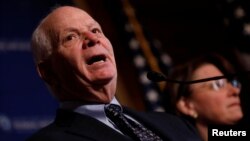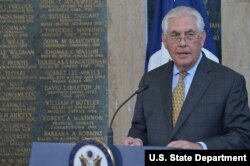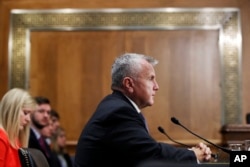U.S. senators of both political parties piled on in defense of America’s role as a human rights advocate, one week after Secretary of State Rex Tillerson suggested that a values based outreach to the world hinders U.S. national security goals.
“America’s strength is in our ideals, our values: speaking up for democracy, speaking up for human rights, anti-corruption and embracing diversity,” said Democratic Senator Ben Cardin of Maryland.
“So many of the groups around the world who are fighting for the principles that we as a nation stand for – democracy, a free press, freedom of religion, freedom of expression – they look to America for inspiration,” said Republican Senator Marco Rubio of Florida.
Both lawmakers spoke Tuesday at a hearing of the Senate Foreign Relations Committee, one day after Republican Senator John McCain of Arizona penned an opinion piece in The New York Times newspaper in which he accused Tillerson of turning his back on decades of American human rights advocacy on the world stage.
Addressing State Department employees last week, Tillerson was quoted as saying that “in some circumstances, if you condition our national security efforts on someone adopting our values, we probably can’t achieve our national security goals.”
“With those words, Secretary Tillerson sent a message to oppressed people everywhere: Don’t look to the United States for hope,” McCain wrote. “[I]f you happen to be in the way of our forging relationships with your oppressors that could serve our security and economic interests, good luck to you. You’re on your own.”
McCain wasn’t alone in his criticism.
“Leading with our values, including prioritizing human rights in our diplomacy, is a critical part of promoting our national security,” said Democratic Senator Robert Menendez of New Jersey. “I am really concerned about Secretary Tillerson’s comments.”
The Foreign Relations Committee met to consider President Donald Trump’s nominee for deputy secretary of state, John Sullivan, an attorney and former Commerce Department official during the George W. Bush administration.
Sullivan attempted to reassure senators he understands their concerns.
“I’m committed to making the State Department the preeminent force to protect American values and promote American values in the world,” the nominee said at his confirmation hearing.
While applauding Sullivan’s statement, senators noted that the Trump administration has proposed massive cuts to the State Department budget, as well as a top-to-bottom overhaul of its operations.
The committee’s chairman, Republican Bob Corker of Tennessee, said many agencies, including the Pentagon, rely on a robust State Department.
“To the extent we don’t carry out these [diplomatic] activities, our men and women in uniform that we respect and admire more likely are going to be in harm’s way,” Corker said.
Sullivan argued that a thorough State Department reorganization is overdue and could yield cost savings without sacrificing America’s diplomatic outreach.
“The world has changed in the 21st century, and our State Department and the way it’s organized hasn’t changed,” the nominee said.
In response, Democratic Senator Chris Murphy of Connecticut said current global challenges require more non-military U.S. resources, not fewer.
“What has really changed is the panoply of non-military threats: disease, epidemics, famine, global warming, creeping corruption,” Murphy said. “What worries me … given that all of these non-military threats have multiplied, [is that] this reorganization has been pre-determined by a president who has called for a 30 percent reduction in the capacity of the State Department, while calling for a $50 billion investment in the Department of Defense.”












